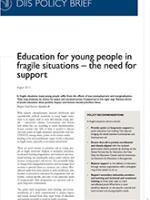Aid that makes a difference
Unemployment, lack of livelihood opportunities and immense vulnerability caused by the effects of war and unstable political transitions is the reality of many young people in fragile and conflict-affected countries. There is an urgent need to provide them with alternatives. Certain forms of training and education have shown great results: reduced violence, new hope and active contributions to their societies. Such impact requires considerable funding, and long-term commitment.
This policy brief by Birgitte Lind Petersen recounts the most important findings from a recent DIIS report, commissioned by Danida as part of the Research and Communication (ReCom) programme on foreign aid. The brief highlights the documented impact and the most important lessons learned from three specific forms of education programmes for young people in fragile and conflict-affected countries.
It provides four overall recommendations for donors:
- Provide quick and long-term support to youth education and training
- Ensure that aid is pooled, coordinated and closely aligned with recipient government and leading global norms
- Balance support to delivery of education through various organisations with a strengthening of the system to do so.
- Support secondary education, accelerated learning and technical and vocational training as three main ways to reach war-affected youth

